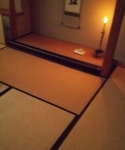12 June 2015
A Smart Phone and turn of Civilization
More than a year ago, I switched from the small mobile phone I had been using for more than five years to a cutting-edge smartphone. Almost everyone I knew had already made this change. Among young people, practically everyone uses a smartphone these days, while the users of mobile phones all tend to be in older age brackets.
A smartphone is operated by using its touch screen, but I had heard their batteries soon run out, so I had long been hesitant about getting one. However, my cell phone was getting old and its performance was fading, so I decided that if it had to be replaced, I would get a smartphone. I was surprised at how quickly I figured out how to use it. My new smartphone had so many functions I’d never seen before and was just like using a personal computer, so I became adept at doing various things on it. That in itself is quite impressive, but it recently got me thinking.
I wondered, is it OK to seek such convenient items even more than we already do? Should we constantly worship the latest technology and continue our lifestyles in which we buy one new thing after another? To take the question a step further, will this way of living continue unabated? Surely at some point, we will reach a limit.
I began thinking seriously about these questions after the Fukushima nuclear accident four years ago. How long will this era in which we take electricity for granted, no matter where we are, go on? I wondered about this when I saw towns and cities being thrown into darkness due to a power shortage.
Come to think about it, people began using electricity in their everyday lives only about 100 years ago. In the course of human history, this is merely the last couple of generations. Now we depend so heavily on electricity that civilized society itself would collapse without it.
Despite all this, electricity is actually not easy to produce. Most of it is created from natural resources that exist in limited quantities underground, such as the burning of oil, coal and natural gas, or through a nuclear fission chain reaction using uranium. Truth be told, some of these resources are so scarce that their supplies will run out within a century. Furthermore, using them creates some terrible by-products: burning these resources leads to global warming that generates rapid climate change, and fission runs the risk of radiation leaks as well as producing nuclear waste that will need to be permanently stored and managed.
Wind and solar are recognized as new ways of generating renewable energy, however comparatively the amount of energy produced is much less. Additionally, despite the production of these power generators, natural resources are still needed, therefore it’s not all that significant of a contribution.
Eventually, at some point a time will come when we must live off ofmuch less power consumption than we do now. If becomes the case, what should we do?
This has nothing to do with our current generation. There is also the notion of using up natural resources and enjoying ourselves while we still can. This will also bring about a feeling of remorseful towards future descendants.
I think the best answer is to make an effort to promote the reuse of natural resources, increase the share of renewable energy, and develop more energy saving techniques. However, shouldn't we actually address it by moving more towards changing our lifestyles to not use so much electricity. We should be trying to move closer, even if only a little, to a lifestyle that was considered normal up until a century ago, a lifestyle without using energy, and save a livable world for our descendants.
Stop using vending machines, stop having things like 24 hour convenience stores and restaurants. Even stop using neon signs along roads. It’s absurd to have cities that are always lit up.Start to curtail unnecessary things.
I think we must become able to enjoy these things, rather than think of them as painful. Last year I had a personal experience that can relate to this, a power saving tea ceremony held at a tea ceremony school. In fact, the tearoom did not use any power at all.
It was the afternoon but we did not use electric lighting, I had macha and sweets in a dark tearoom that was lit up by the mere glow of candles.

While I sensed the inconvenience and darkness around my hands, at the same time I experienced the elegance of it too. I was able to enjoy flavors in the macha and sweets that were not there before. If I think about it, Sen No Likyu of the warring states period (16th century) who began the tea ceremony must have felt like this, so this was like an experience of the original tea ceremony.
Why not try to gradually move our daily lives closer to this style.
If that happens people will say, what should we do about smart phones and computers, but on the contrary I think this is what we need. It is also for proposing those reactionary, but yet still aiming towards the future kind of lifestyles and spreading them to lots of people.
For those of you who have read this article, why not think it over.
18:08 Posted in Ecology, Science, Society | Permalink | Comments (0)






The comments are closed.